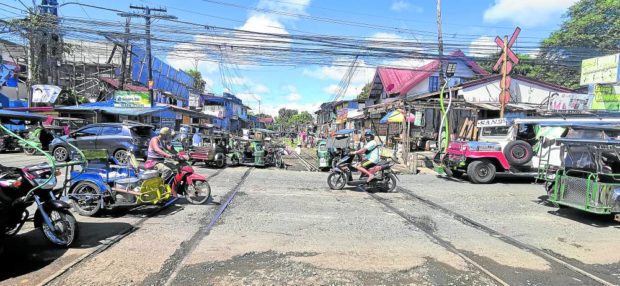
RIGHT OF WAY: Residents along the tracks of the Philippine National Railways (PNR) in Lucena City are worried that they will be displaced as train trips between Quezon and Laguna resume soon. They are appealing to PNR officials to give them proper relocation before they are driven away from the place that they long called home. (Photo by DELFIN T. MALLARI JR. / Inquirer Southern Luzon)
LUCENA CITY—The Philippine National Railways (PNR) on Monday started a test run for its San Pablo City to Lucena City route, sparking excitement among people who wanted an alternative mode of transportation between the provinces of Laguna and Quezon.
Passengers were expecting regular trips to start on Tuesday only to be told by station personnel here that no train was coming.
“There were already waiting passengers here (on Tuesday). They were all disappointed when they learned of the sudden stoppage of the train operation,” a PNR worker at the station here told the Inquirer on Wednesday. The worker, who asked not to be named, said trips would resume on March 10.
When reached by the Inquirer, Russel Pagkaliwangan, the PNR engineering Lucena division manager, confirmed the trip suspension on the 44-kilometer route but declined to provide details as he was not authorized to speak on the matter.
The Inquirer tried to reach lawyer Ces Lauta, the PNR assistant general manager, but calls and a text message went unanswered.
Transportation Secretary Arthur Tugade graced the initial trip from Lucena to San Pablo on Feb. 14. A statement from the Department of Transportation (DOTr) said Tugade, while inspecting the line, invited some commuters to also ride the train.
“It’s comfortable and cheaper. The travel time is OK, not slow and not fast compared to passenger buses and jeeps,” said carpenter Lito Montoya, who was among the train’s first passengers.
AWAITING RESTORATION: The 83-year-old Philippine National Railways station in Lucena City, one of the busiest stops of the old Manila-Bicol route, remains in a state of disrepair since 2015 when the local government stopped its restoration due to lack of permits. —DELFIN T. MALLARI JR.
Settlers
Fare is P50, cheaper than the P130 for a bus ride or several jeepney fares for the same route.The San Pablo-Lucena route has scheduled trips daily, according to the DOTr. The trip from Lucena to San Pablo starts at 5 a.m. Succeeding trips are scheduled at 9 a.m., 1:30 p.m. and 5:30 p.m. for the last trip.
Trips from San Pablo to Lucena are scheduled at 7 a.m., 11 a.m., 3:30 p.m. and 7:30 p.m.
Travel time through four flag stops in the Quezon towns of Sariaya, Candelaria and Tiaong is 1 hour and 30 minutes.
The San Pablo-Lucena line ceased operation in October 2013 after the collapse of an abutment.
In a statement, Tugade said the reopening of the route would not only link the rail line to the Bicol network but will also unlock economic potential and enhance mobility in Southern Luzon.
Aside from its use as a passenger commuter service, the route can also be converted into a commercial or cargo freight service, he added.
However, the resumption of train travel has worried settlers along the tracks.
“This means we have to be on guard again for possible eviction,” said a resident, who asked not to be named for fear of angering PNR officials.
The settlers renewed their appeal to the PNR to consult them before they are asked to leave their homes.
“We’re all willing to be relocated. But the government should first secure a proper resettlement area for us,” said another resident, a former vendor servicing train passengers.
Heritage structure
Restoration work for the PNR Lucena station has yet to resume after it was stopped by the city government in 2015 for lack of local permits.
The 83-year-old stone-walled station is considered one of the remaining heritage structures in this Quezon capital.The local government maintained that under Republic Act No. 10066, or the National Cultural Heritage Act of 2009, structures at least 50 years old are considered “important cultural property.”
Vladimir Nieto, president of Konseho ng Herencia ng Lucena, or Lucena Heritage Council, urged the city government to shoulder the rehabilitation cost of the station.
Citing information from Pagkaliwangan, Nieto said “the PNR has no extra budget for the improvement of the station.”
“The ball is now in the hands of the city government,” he said in an online interview Wednesday.
RELATED STORIES
Lucena mayor orders PNR to stop restoration of 77-year-old station
In Lucena City, balance of heritage, rail need approaches